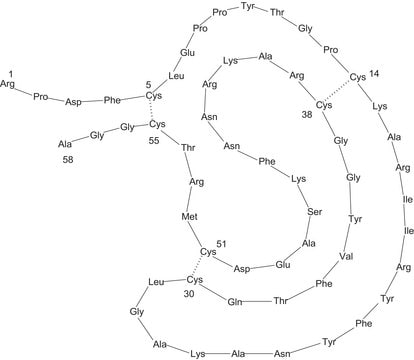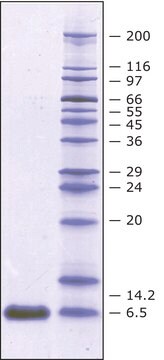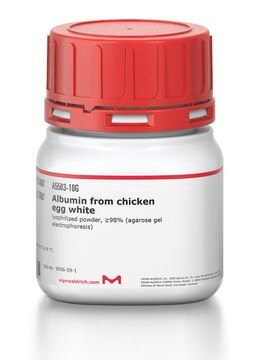A6106
Aprotinin
BioUltra, 3-8 TIU/mg solid, powder, ≥98% (SDS-PAGE), suitable for inhibition assay
Synonym(s):
BPTI, Bovine pancreatic trypsin inhibitor, Trasylol, Trypsin inhibitor (basic)
About This Item
Recommended Products
Product Name
Aprotinin from bovine lung, BioUltra, 3-8 TIU/mg solid, ≥98% (SDS-PAGE)
biological source
bovine lung
Quality Level
product line
BioUltra
Assay
≥98% (SDS-PAGE)
form
powder
specific activity
3-8 TIU/mg solid
mol wt
~6,500
technique(s)
inhibition assay: suitable
solubility
H2O: 5 mg/mL, clear to very slightly hazy
UniProt accession no.
storage temp.
2-8°C
InChI key
ZPNFWUPYTFPOJU-UHFFFAOYSA-N
Gene Information
cow ... PTI(404172)
Looking for similar products? Visit Product Comparison Guide
Application
Biochem/physiol Actions
Unit Definition
Preparation Note
Not finding the right product?
Try our Product Selector Tool.
Storage Class Code
11 - Combustible Solids
WGK
WGK 1
Flash Point(F)
Not applicable
Flash Point(C)
Not applicable
Personal Protective Equipment
Choose from one of the most recent versions:
Already Own This Product?
Find documentation for the products that you have recently purchased in the Document Library.
Customers Also Viewed
Protocols
Objective: To standardize a procedure for the enzymatic assay of Aprotinin.
Our team of scientists has experience in all areas of research including Life Science, Material Science, Chemical Synthesis, Chromatography, Analytical and many others.
Contact Technical Service







